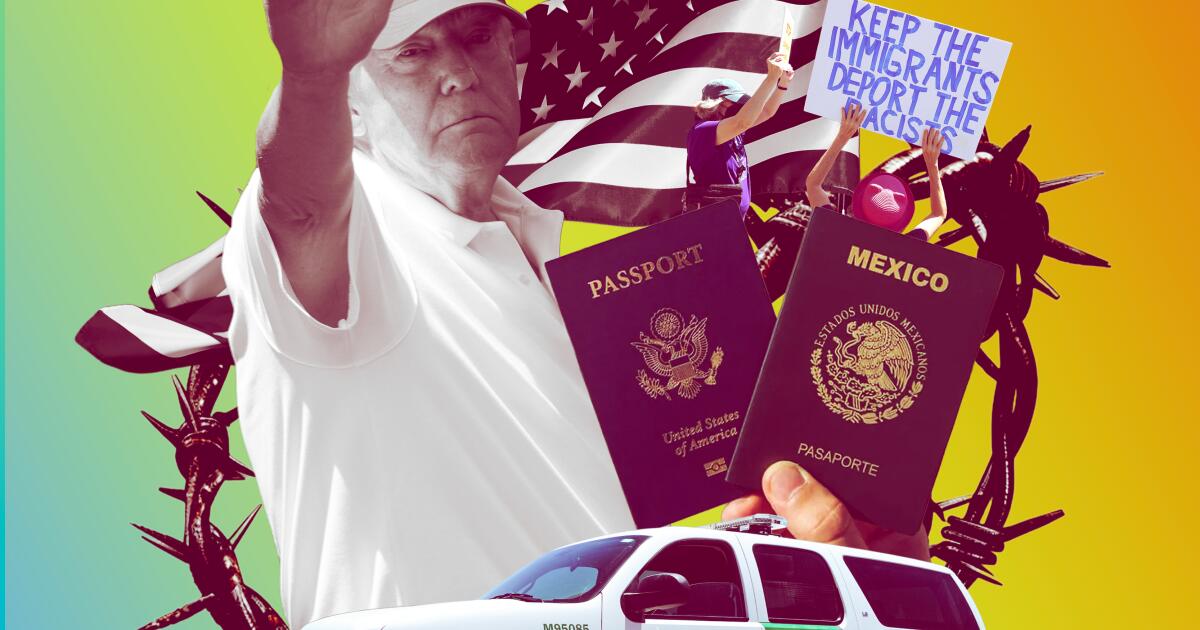As the Trump administration continues to target the undocumented community and urge them to self-deport, some U.S. citizens have considered leaving the country themselves.
Earlier this summer, Julie Ear dropped off her mother at the Tijuana airport to self-deport. She documented the tearful departure in a TikTok video, which has since reached over 9.3 million views and garnered thousands of sympathetic comments.
“With my mom’s complicated legal status, she decided to [self-deport] on her own terms,” Ear says in the clip. At the time of the video’s publication, ICE raids were spreading across Southern California, her mother’s home for the past 36 years.
In March, the Trump administration rolled out its multimillion-dollar ad campaign warning undocumented individuals to self-deport or face the consequences of deportation. This strategy is part of Trump’s pledge to deport 1 million unauthorized immigrants per year, which has also offered individuals $1,000 and a free flight to self-deport.
While much of Trump’s campaign was focused on undocumented immigrants who had committed violent crimes, it has now shifted its focus to anyone residing in the U.S. without legal authorization (which is still considered a civil violation). In some cases, the Trump administration has also targeted those with DACA protection, whom they have urged to self-deport as well.
“She has no criminal record, she’s a hard-working taxpayer who has been working 12 hour shifts since she was 15, six days out of the week,” says Ear of her mother in the video. “She never asked for a handout, she didn’t get food stamps, she didn’t get welfare.”
This campaign has triggered many in the immigrant community to leave their families and homes in the U.S. and return to their countries of origin. But it also strikes fear in those born to immigrants in the U.S., especially as the future of birthright citizenship remains in limbo.
“Are we even safe as American citizens?” asks Ear in an interview with The Times — citing instances in which U.S. citizens have been taken into ICE custody. “ Even though we were born here, we don’t know if we’re gonna be safe long term.”
Ear says many of her friends, concerned for their quality of life in the U.S., are now looking to obtain dual citizenship and buy property abroad, especially as the average home price in Southern California has climbed to $875,128 — while the hourly minimum wage in Los Angeles remains at $17.28.
“My friends are having meetings with council members, the mayor, talking about what laws we can pass to protect the Latino community in L.A.,” said Ear. “Then I also have those friends that are thinking of buying land and houses out there [in Mexico], and getting their dual citizenship.”
Nicole Macias, a longtime Angeleno whose family owns a legacy business on the Olvera Street strip, applied for dual Mexican citizenship last year through Doble Nacionalidad Express, a law firm specializing in helping individuals obtain dual citizenship. Macias has since turned to social media to educate others about the dual citizenship process.
“The political climate right now in Los Angeles is really crazy. A lot of people just feel unsafe,” Macias told The Times. “A lot of people are turning back to this idea of being able to go back to Mexico and have an easier lifestyle.”
But it isn’t just U.S.-born Latinos who are seeking refuge in other countries.
A record number of 1,931 Americans applied for British citizenship between January and March, according to stats by the U.K. government — a 12% jump from the previous 2024 quarter. Some Canadian lawyers also noticed an uptick in Americans seeking Canadian citizenship in recent months, with many stating that they are fearful of the political uncertainty in the U.S.
A survey conducted by Expatsi, a travel company for expats, found that of the 116,000 Americans surveyed, more than half were motivated by political divisions in the country.
“ I think a lot of people are turning [to] dual citizenship and leaving the States because it’s probably a safer option,” says Macias. “This [is] people’s plan B for their future and for their safety and the safety of their families.”
